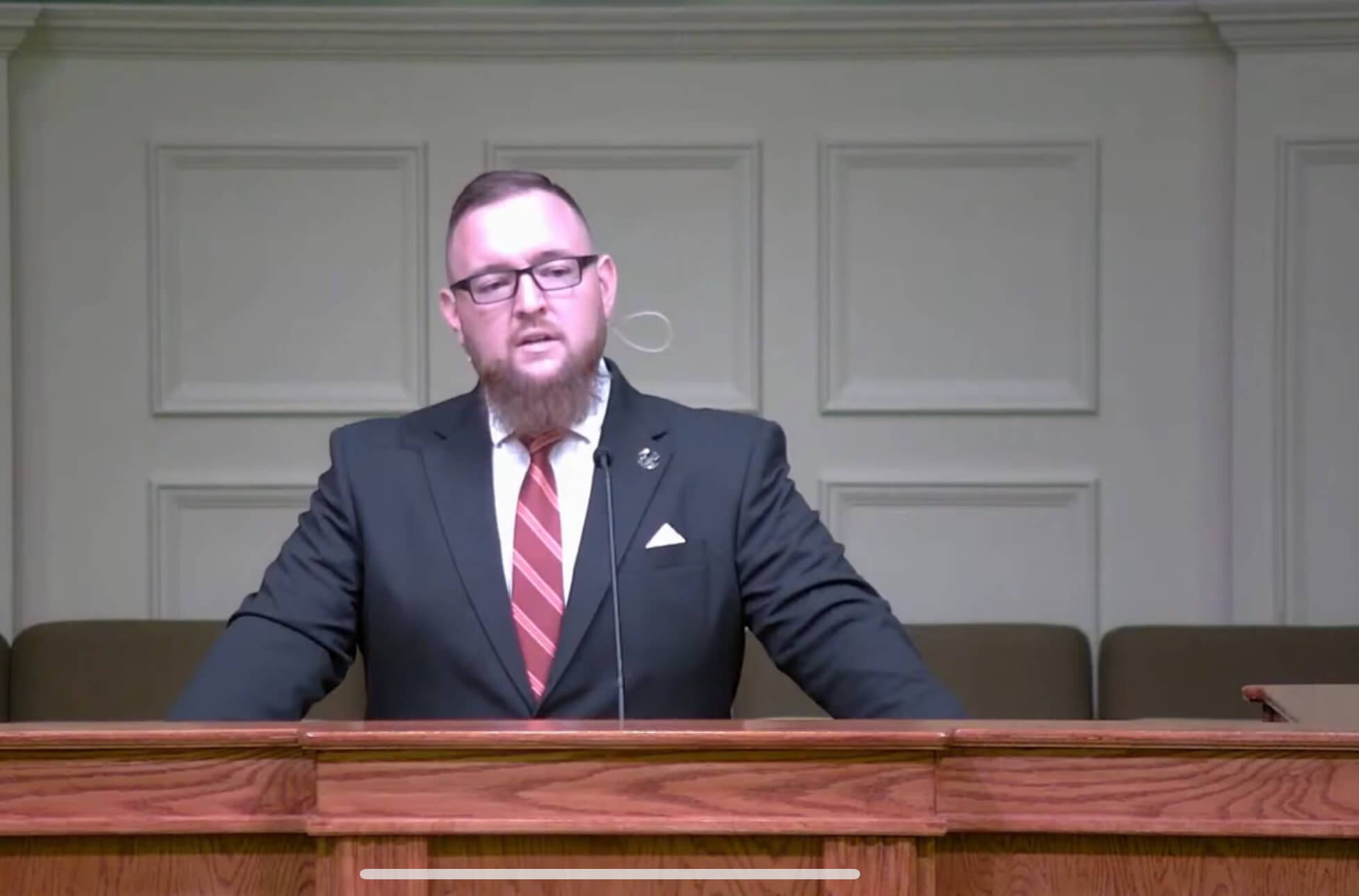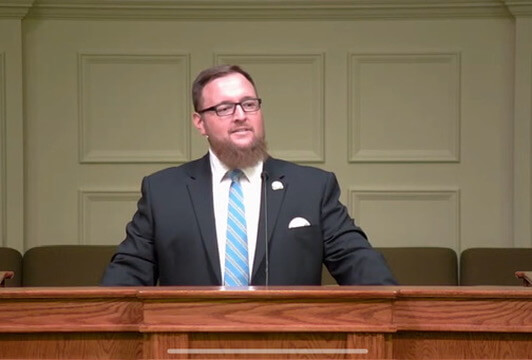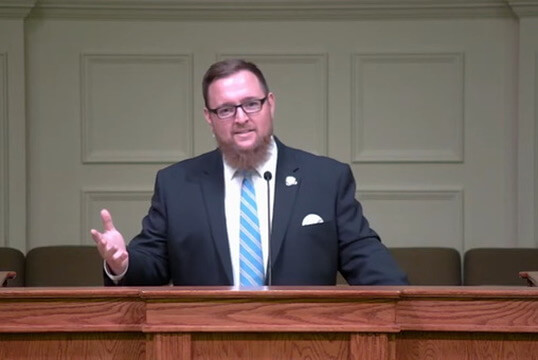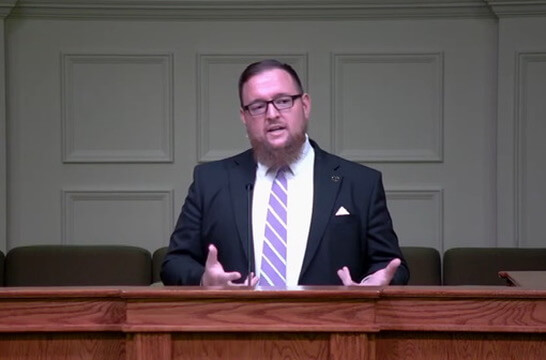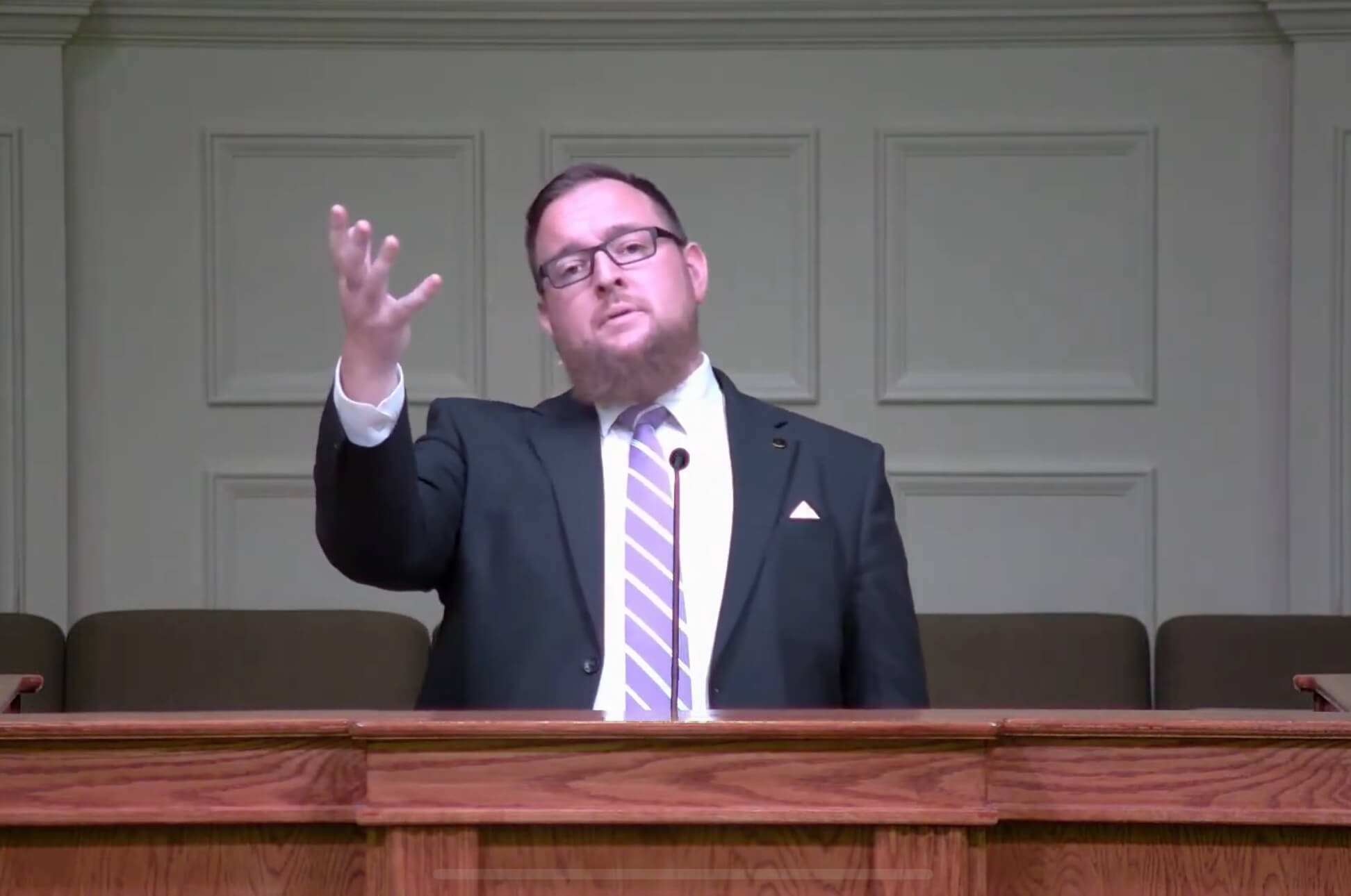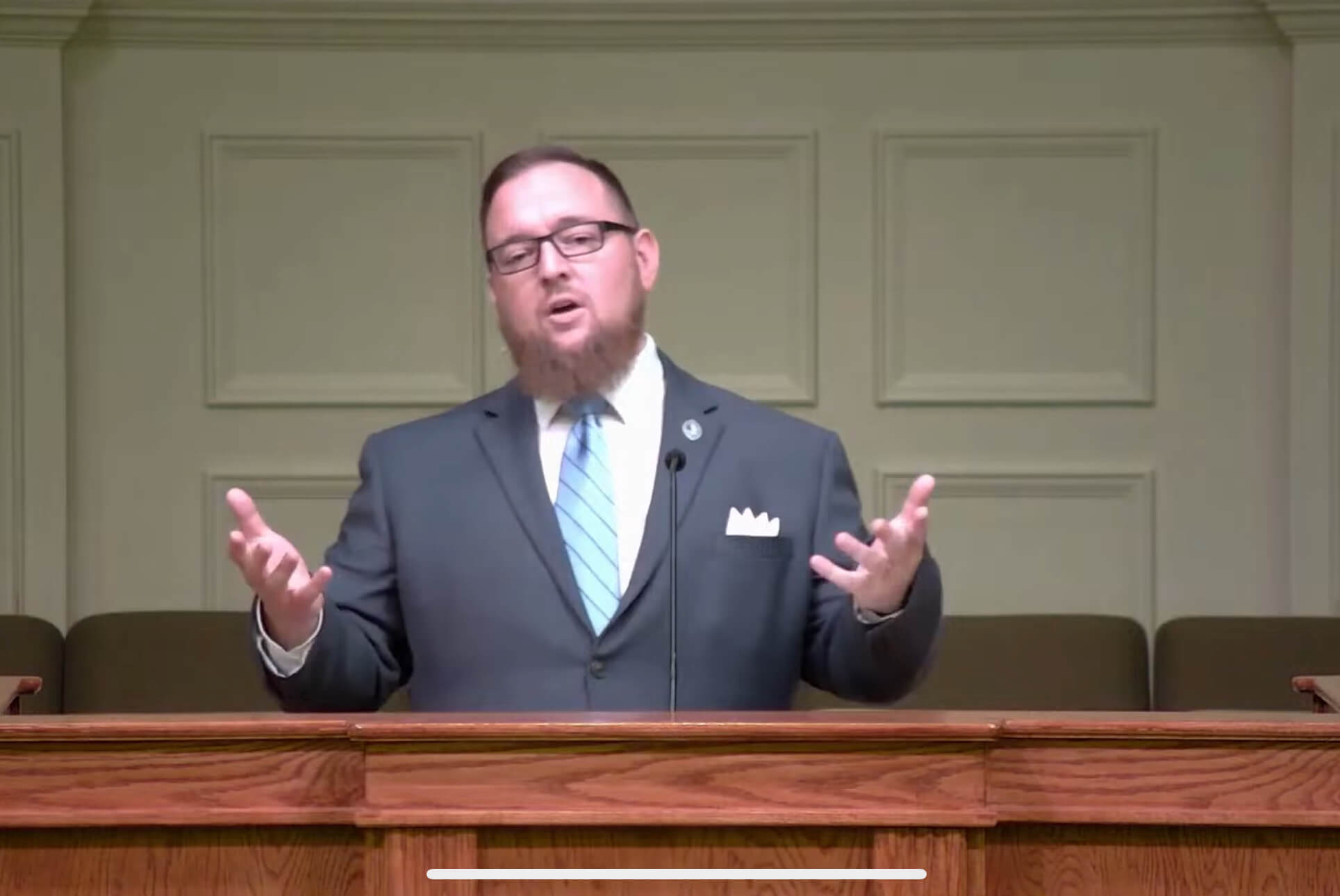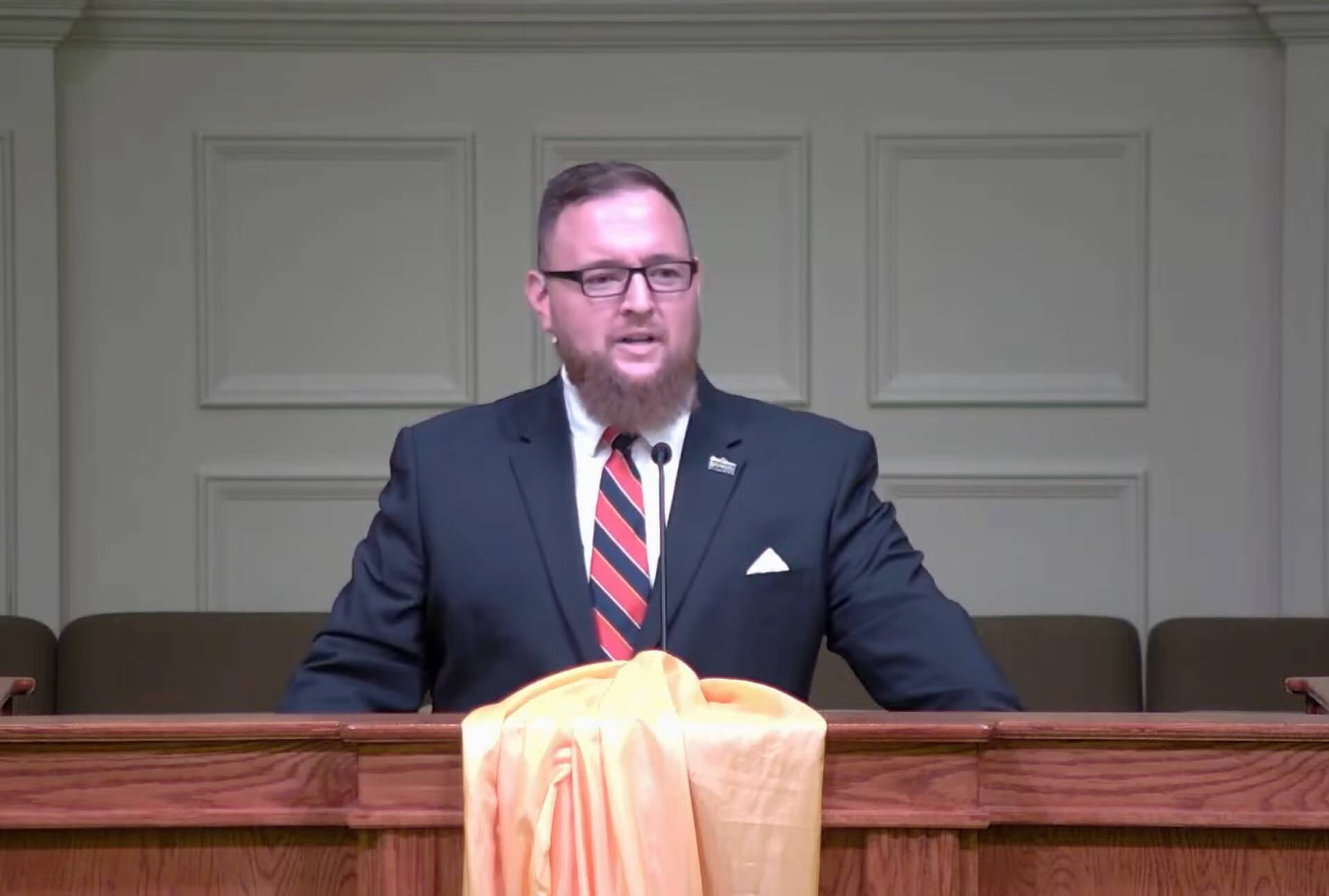Video
“Hope in Yahweh”
Psalm 27
Pastor Ryan J. McKeen
10/06/24
Audio
Transcript
Turn with me in your Bibles to Psalm 27. Psalm 27. As our songs have been focused on tonight, our focus this evening in this Psalm of David is that our hope is in the Lord.
One of the greatest needs of all human beings is hope. We need to have something to hope in. We need to have a reason to believe that there’s something more, that there’s something better than what we’re seeing right now. Someone has said that if you could convince a man that there is no hope, he would curse the day that he is born. Because hope is an indispensable aspect of the human life.
As I was researching this topic of hope, I found this story from December of 1927. And on December 17, 1927, the tragedy of the sinking of the S-4 submarine off the coast of Massachusetts happened. The submarine was rammed by another ship as they were conducting drills, and it quickly sank. And the entire crew was trapped inside this submarine at the bottom of the harbor. Ships rushed to the scene of the disaster, And they were beginning to be able to communicate through Morse code to the remaining sailors that were alive at the time in this submarine. We don’t know everything that took place on that submarine, but as they clung to life, their oxygen slowly gave out. And one of the divers that was able to communicate with this submarine heard the tapping noise on the side of the sunken submarine. And as he listened, there were several different codes that came out, but one of the questions that came from the crew of the submarine in Morse code was, is there any hope? Is there any hope? And this seems to be the cry of all humanity.
Hope is indeed critical to our existence. And there is only true hope in Christ. Hope cannot be found anywhere else in this world. You can look around all you want, but anything that pretends to be hopeful is nothing but a mirage and a lie. There is no lasting source of hope outside of Christ. You can hope for the right outcome in an election, but those politicians will disappoint. You can be guaranteed of that. You can hope for a different path for a hurricane, but you have no control over that. So our passage of scripture tonight is all about hope.
Psalm 27 is all about hope. So as we consider this psalm, where is it that you place your hope? What do you look to in order to make life better, in order to have a reason for living life? Where does your hope come from? That’s the question of this text this evening. Psalm 27 is a psalm of David. And it’s been a psalm of some controversy among biblical scholars. Some think it’s actually two different psalms put into one, put together by later editors. And we’ll look at that a little later, but that’s just not true. But the claim is made because of the apparent paradox in the text.
A paradox is something that seems to be self-contradictory, something that contradicts what was already said. Something that two statements within cannot both be true. And that’s exactly what we see in this text. An apparent paradox. Something that seems to contradict what’s said earlier in the psalm. The first thing we see is a complete assurance that God will deliver. And then we see a desperate plea for God to do something. For God to save. And this only seems like a problem if you don’t understand faith. Because that’s just the way it is sometimes. That’s the way it is with our faith. Sometimes we feel completely confident that God will deliver. And then in a moment, we can wonder if God’s even there. And that’s what we see revealed in Psalm 27.
We all feel that, and so did David. And this Psalm divides into three different sections. We see first, verses 1 through 6, that Yahweh is my assurance. But then as we get to verses 7 through 12, we see that Yahweh is my help. The closing section of this Psalm is verses 13 and 14, that Yahweh is my hope. So Yahweh is my assurance, Yahweh is my help, and Yahweh is my hope. So let’s begin to look at this Psalm, Psalm 27.
I’m going to read our first section here this evening, Psalm 27, verses one through six. This is the word of the Lord. It says, of David, Yahweh is my light and my salvation. Whom shall I fear? Yahweh is the strong defense of my life. Whom shall I dread? When evildoers come upon me to devour my flesh, my adversaries and my enemies, they stumbled and fell. Though a host encamp against me, my heart will not fear. Though war arise against me, in this I trust. One thing I have asked from Yahweh, that shall I seek. That I may dwell in the house of Yahweh all the days of my life. to behold the beauty of Yahweh and to inquire in his temple. For in the day of calamity, he will conceal me in his shelter. In the secret place of his tent, he will hide me and he will lift me up on a rock. And now my head will be lifted up above my enemies around me and I will offer in his tent sacrifices with loud shouts of joy. I will sing and I will sing praises to Yahweh.
And that is the opening section of this psalm. And it is all about assurance. And you need to remember, all of these psalms, including this one, were worship songs to be sung by the congregation of Israel. In fact, beginning next Sunday morning, we’re going to start learning Psalm 27 to sing together. So it’ll be fitting to introduce and explain this psalm this evening. But in this first section, it’s very positive and very confident. David seems like a man who has absolutely no doubt in where his assurance is and who God is. Because David’s assurance begins in verses one through three with exactly who Yahweh, his God, is.
Verse one, he says, Yahweh is my light. and my salvation, whom shall I fear? Yahweh is the strong defense of my life, whom shall I dread? And it follows that if Yahweh, this God of Israel, if He is the light, and if He is salvation, and if He is a strong defense, then what is there to fear? What could there be to fear with a God like that? It’s reminiscent of Psalm 118:6 that says, Yahweh is for me, I will not fear. What can man do to me? And that’s exactly the question. What can man do to me when we have a God like this?
And David’s confidence is not just blind faith. Because verse two, he explains what he has seen, what God has done for him already. He says in verse two, when evildoers came upon me to devour my flesh and my adversaries and my enemies, they stumbled and fell. So David’s remembering past occasions of God’s deliverance, when his enemies were pursuing him and ultimately they were frustrated and they were crushed and they fell. And these deliverances give him this confident outlook to the future. Whom shall I fear? Because when evildoers came upon me to devour me, they fell. It shows his outlook to the future because of what’s already happened.
Verse three, he says, though I host and camp against me, my heart will not fear. Though war arise against me, in this I trust. David, a king of a great nation, a great nation who was attacked many times, who went to war many times, and he has absolutely no fear because he knows the God in whom he trusts. David has become, in his confession here, he has become fearless because of one thing. It’s not because the might of his own warriors in battle. It’s not because of his own armies, even though he had formidable armies, even though he had formidable warriors on his side. His trust was not in his warriors. His trust was in God. It was God who would deliver. The root of David’s assurance comes from Yahweh’s being, from who he is, from the God that he worships. And this character is shown in defeating his enemies.
So what is it that we fear? What is it that you fear? And where do you go to calm those fears? Where do you go to make yourself feel better when you’re just uneasy about life, when you don’t know how things are gonna turn out, when you don’t know what the result is gonna be? When you’re worried and when you’re anxious and when you’re afraid, what is it that puts your fears to rest? Is it your wealth? Is it your comfortable routines? Is it your family? Is it your status, how people see you? What is it that makes you feel better about life when fear is on the horizon? In speaking of fear and how David responds to fear.
The great preacher Charles Spurgeon once made this analogy. He says this, a little child was at play in a lower room. And as he played away by himself, amusing himself, about every 10 minutes, he ran to the foot of the stairs and cried out, mother, are you there? His mother answered, yes, I’m here. And so the little boy went back to his sport and his fun and was happy and happy as could be, until again, it crossed his mind that his mother might’ve gone. And so he ran to the stairs again and called out, mother, are you there? All right, she said. And as soon as he heard her voice again, back he went once more to his play. And Spurgeon continues, it is just so with us. In times of temporal trouble, we go to the mercy seat in prayer. And we say, Father, are you there? Is it your hand that’s troubling me? Is it your providence that sent me this difficulty? And as soon as you hear the voice that says, it is I, you are no longer afraid. Happy are they who, when they are afraid in this way, trust in the Lord.
That’s what David is doing here. He is reminding himself of who God is. He’s reminding himself that God is there. God has been there and God will be there. He’s reminding himself of the only one who can give him this comfort. The only one who’s shown himself able to deliver. And this desire to feel the nearness of God is seen in the next verses. In verse four, he says, one thing I have asked from Yahweh, and that shall I seek, that I may dwell in the house of Yahweh all the days of my life, to behold the beauty of Yahweh and to inquire in his temple.
The house of Yahweh was the tabernacle. This is where the presence of Yahweh dwelt. David wasn’t able to build a house for God, the temple, Solomon did that. So in this time, God dwelt in the tabernacle, the tent in Israel. And that’s where his presence was, and David is revealing the desire of his heart. I want to be with God every day of my life. I want to be in his presence. I want to be in the tabernacle with God every day. Now he’s the king. That can’t be a reality. He can’t be in the tabernacle every single day, 24 hours a day. But he says, this is what I seek. This is my desire. I want to be with God. I want to dwell with God.
His time in God’s house and in Yahweh’s house, in his presence, intensifies his assurance. Because as verse five explains, four, so this is following his desiring to be with the presence of God in the Lord’s house. He says, four, in the day of calamity, he will conceal me in his shelter. In the secret place of his tent, he will hide me. He will lift me up on a rock. These convictions of David, these things David knows to be true, are the result of his communion with God in verse four. Time spent in God’s presence, as he says, gazing upon his beauty, to behold the beauty of Yahweh in his house, contemplating all that God is, all that God has done, all that God is for his people, That has a way of reinforcing David’s confidence. It has a way of reinforcing our confidence. It makes us even more sure that we are safe in his hands. Assurance intensifies with personal communion and worship.
So as you face the different difficulties in life, are you struggling with assurance? Are you struggling that God actually loves you? Are you struggling with your assurance that he will take care of you? Are you struggling with your assurance that you’re saved? That you are truly one of his children? Well, let me ask you this. How much time are you spending with him? How much time are you spending in his word? How much time are you spending in prayer? How much time are you spending at church with fellow believers? Assurance intensifies with communion with God and worship of God.
Now, you may still struggle at times, even though you desire to be in the house of God and commune and worship Him. David did. We just saw that. But you can be sure that by spending time with him, worshiping him, reading his word, praying to him, fellowshipping with his children, that will build your assurance. Think about how David saw spending time with God.
Verse five, it says, he’s being hidden in his shelter. He will conceal me in his shelter. That word there for shelter, it’s also translated in other places as a lair, like a lion’s lair. It’s used in a few different spots, but it’s like a hidden place. Think of the Lord as this lion in whose lair his servant is hidden. His servant who is being pursued by his enemies. Who’s going to dare to go to where the Lord has hidden him in his shelter, in his lair? Think of how safe he is in the presence of God. He also says he’s hidden in the cover of his tent. And not only that, but he will be placed high upon a rock. And this imagery that’s given here is meant to pile up these pictures of complete and utter safety. Complete safety in the presence of the entirely sovereign God. That’s what it means to be a child of God. That’s what it’s like to dwell in His presence.
Verse 6 shows the joyful thanksgiving that David has for enjoying the Lord’s presence. Verse six says, and now my head will be lifted up above my enemies around me, and I will offer in his tent sacrifices. With loud shouts of joy, I will sing. I will sing praises to Yahweh. That’s David’s enjoyment of his time with God in God’s house. And I think a major takeaway from this beginning section of this psalm, a major takeaway here for David is he sees that time spent in the house of the Lord is never wasted. Time spent with God is never wasted. It only gives us more and more of an impression of who God is, of his preserving work, of his defending work, He is a God who will hide us in his secret place and protect us and lift us up when we need it.
As one commenter said, the Lord of the sanctuary is also the Lord of the battlefield. And he has a way of showing up there too. That’s where David’s assurance is found. And that’s our first section of this Psalm, that Yahweh is my assurance.
Now we come to verse seven, which begins that Yahweh is my help. Yahweh is my help. Verses seven through 12 read this way. Hear, O Yahweh, when I call with my voice, and be gracious to me, and answer me. On your behalf, my heart says, seek my face. Your face, O Yahweh, will I seek. Do not hide your face from me. Do not turn your slave away in anger. You have been my help. Do not abandon me and do not forsake me, O God of my salvation. For my father and my mother have forsaken me, but Yahweh will take me up. Instruct me in your way, O Yahweh, and lead me in a level path because of my foes. Do not give me over to the desire of my adversaries. for false witnesses have risen against me, and such as breathe out violence.”
A little different tone than the first half of this psalm. The confident assurance seems to have vanished. We seem to be breathing different air here. The calm assurance that flooded over the first six verses of David’s psalm has given way to an urgent and desperate plea for God’s help.
He says in verse 7, hear oh Yahweh when I call with my voice and be gracious to me and answer me. This is coming off his confidence and his desire to spend every day in the presence of God in his house. And his confidence that my head will be lifted up above my enemies around me. I will sing, I will sing praises to Yahweh. Verse seven, where are you? Hear me when I call with my voice. Be gracious to me and answer me. And we see in verse eight that this is not because of disobedience on David’s part. We’re saying on your behalf, my heart says, seek my face, your face. Oh, Yahweh, I shall seek.
This is a tricky verse to translate. That’s why all the different versions have it differently. But what is being communicated here is that God has told his people to seek after him. David, that’s why David says on your behalf. I have told people we need to seek after God. God has told them, seek after me and you will find me. And David says, your face I shall seek. This isn’t a cause of neglect on David’s part. David’s saying, yes, I am seeking you. I’ve been seeking you. Why aren’t you hearing me?
Sometimes you might get the idea that obedience to God will guarantee a good life, a good result. That if I obey God, then everything is going to be going fine. And therefore, if things aren’t going fine, I must have not obeyed God somewhere. I must have messed up. This verse flies in the face of those who say, if you have enough faith, God will give you what you want. David’s saying, I have been seeking you, but I’m still in trouble. I’m still facing these adversaries, these enemies, this hardship. I have been seeking you.
Verse nine. He says, do not hide your face from me. Do not turn your slave away in anger. You have been my help. Do not abandon me and do not forsake me, O God of my salvation. Do not hide your face from me. Do not turn your slave away in anger. David’s saying, I am your slave. I’m your servant. You’re my master. I serve you with my life. Why are you turning me away? You have been my help. Don’t leave me now when I need you the most. Obedience doesn’t make it easy. And living right doesn’t mean everything’s going to work out the way you want it.
Sometimes we can do all the right things and God still lets us suffer. And sometimes that’s hard to hear. Because we want an easy answer. We want something to do to make it better. We want it to be a give and take. Like, I’ll give a little, and God, you need to give a little back. We want this exchange economy with God. That if I obey, then you’re gonna make it okay. But that’s not how it works. God lets us suffer at times for reasons that we can’t explain. We just don’t know. We can’t explain why we’re suffering. But He can. He can. And we can trust that He can explain it, but He doesn’t need to. We can trust His reasons.
Job is a case study of David’s feelings in this psalm. Job could cry out, don’t hide your face from me. Don’t turn your slave away in anger. You have been my help. Don’t abandon me. We can trust God’s reasons. We can trust that God is sovereign over our suffering. God is sovereign over the situations that we don’t like all that much. And David had that trust. Because as we see at the end of verse nine, oh God of my salvation. He is still the God of David’s salvation. Even though it feels like he’s not there, even though it feels like he’s been abandoned and turned away and hidden from, you’re still the God of my salvation.
David is saying, God, I don’t know what you’re doing right now, but you’re still my savior. You are my deliverer. I don’t have anybody else. It has to be you. And that’s exactly where God wants us to be. He wants us to realize there is no one else to trust Him. There is no one else that will deliver us. There is no one else who is the God of our salvation.
And verse 10 is a profound verse. He says, my father and my mother have forsaken me, but Yahweh will take me up. Now, at first glance, it’s a bit puzzling, because we don’t really know what he means by that, that his father and his mother have forsaken him. There may have been some sort of betrayal by his parents that we don’t know about.
But what many commenters say, and I think is probably the case, is David is speaking of their deaths. My father and my mother have left me. The ones who I trusted in to provide for me, to be there for me, they’re gone. They’ve left me. Their passing away has left him feeling alone. But what he’s saying is, my parents have died and left me, but God won’t. Because he says there, after my father and my mother have forsaken me, but, but, it’s a statement of confidence. But God will take me up. Yahweh will take me up. He is still there. He will deliver me. In the midst of this suffering, David is reminding himself of his assurance. He still feels this way. He still feels alone and abandoned and betrayed and desperate. But Yahweh will take me up. God will take me up.
And then he asks for instructions in verses 11 and 12. He says, instruct me in your way, oh Yahweh, and lead me on a level path because of my foes. Do not give me over to the desire of my adversaries, for false witnesses have risen against me, and such as breathe out violence. This is really the central request of the psalm. Earlier, he asked God to hear him, and this is what he wants God to hear.
And he says, teach me or instruct me in your way and lead me on a level path. And this way that he needs to be instructed in is not the law of God. It’s not something that he needs to obey that he hasn’t been doing. He’s asking God to show me what you’re doing here. Show me what I’m supposed to do next. Show me the way out of this. He wants to know the way God wants him to take to get out of this trouble. To show him the pathway through these difficulties that he’s facing.
And this is where we see the paradox in this psalm. David’s plea in trouble here, his plea to be delivered, his plea after asking God, why have you left me? Why have you not heard me? Why have you abandoned me? That seems incompatible with verses one through six. The Yahweh is my light and my salvation. Whom shall I fear? He is the strong defense of my life, whom shall I dread?” So you can see why people think this is two different Psalms. Some critics, as I said, have thought that these two sections are so different in tone and in outlook, they must have been written at two different times, perhaps by even two different writers. These two pieces somehow got cobbled together into one psalm by later editors. But that just doesn’t fly.
As one scholar pointed out, what later editor would even dream of slapping two such different pieces of scripture together? No, they had to have stood as one psalm from the beginning. Because this is the whole point. of the psalm. This paradox is the whole point. This is a psalm that recognizes the roller coaster of faith. Don’t we all know what it’s like to move so quickly from unshakable faith to insurmountable fear? From trust to trouble? From resting in God to pleading for God.
It’s still faith, but this confident, abiding faith of verses 1 through 6 has given away to this desperate and agitated faith in verses 7 through 12. But doesn’t it give you assurance? Doesn’t it give you comfort to read what David had on his heart and say, yes, that’s the way things are sometimes? That’s the way life is. Living for Christ goes just like that sometimes. And these Bible critics that think they can’t go together, it makes sense when you realize a lot of these Bible critics are not believers. They have no idea what the life of faith is like. They don’t get the ups and downs of faith. No, this psalm reflects the way that things really are. That’s often the nature of faith.
There’s this great, awesome, worshipful experience that I feel on Sunday, but then there’s that desperate, fearful anxiety that I face when I go back to my daily life. the calm of faith can quickly become the catastrophe of faith. And they often occur in exactly that order. That when we feel like we’re on the mountaintop, there’s usually a deep valley just ahead. That’s when God throws us a trial to produce endurance in our faith.
James chapter one. Verses two and three, consider it all joy, my brothers, when you encounter various trials, knowing that the testing of your faith brings about perseverance. Not only is God still on the throne in our trials, in our testing of our faith, he has a very specific purpose in it. He knows exactly what he’s doing. He knows exactly what he’s going for in you. He knows exactly what He wants from you in this trial.
And it ought to help us, the saints of God, God’s children, to be able to grab hold of a text like Psalm 27 and say, yes, it can be exactly like that. Because God is sovereign over the good times and the bad times. And sometimes it’s hard to grab onto an idea like God can be sovereign over my suffering. That God has a reason why I’m going through this, that this didn’t just happen and God doesn’t want this to happen in my life.
But I’ll tell you, if God does not have a purpose in your suffering, if God is not sovereign over your suffering, and He doesn’t have a reason why He’s allowing it, there is absolutely no hope in that perspective. If God has no purpose in your suffering, then what’s it all for? But that’s not true. God does have a purpose in our suffering. God does have something he’s bringing about in us through our trials and through the hard times.
The trauma we see in verses 7 through 12 that David is experiencing, it doesn’t nullify his faith in verses 1 through 6. It deepens it. It deepens his faith. We’ve seen his assurance that Yahweh is my assurance in verses one through six. We’ve seen that Yahweh is my help. And now we come to David’s closing of this psalm, really his instructions to those who will read it. His instructions to us. And that is that Yahweh is my hope in verses 13 and 14.
He says, starting in verse 13, I would have despaired unless I had believed that I would see the goodness of Yahweh in the land of the living. Hope in Yahweh. Be strong and let your heart take courage. Hope in Yahweh. Verse 13 here is David’s testimony. And verse 14 is his advice to us. In verse 13 he says, here is where I have come to stand. Here is where I place my feet. And verse 14 is, here is where you should stand. Verse 13 there, the different versions translate it differently.
The LSB and the NKJV actually both get it pretty well. But I think the ESV totally misses it on this verse. In that version it just says, I believe that I will see the goodness of Yahweh. But that misses the whole point of this song. Because he’s explaining to us, I would have despaired unless I believed. I would have lost it if I didn’t have my faith. I would have despaired if I didn’t believe in the goodness of God. The circumstances of verses 7 through 12 would lead anybody to desperate depression and despair. But not David. Not David. Why? because of his faith.
If I had not believed, if not for the good news of the goodness of God, the goodness of Yahweh, if not for the gospel, we would all despair. This is where hope is found. David stands here, even after the mess of verses seven through 12, and he says he believes he will see the goodness of Yahweh in the land of the living, meaning while I’m still alive, I will see the goodness of God.
He expects deliverance to come at some point in his life. And he wants you to be hope-filled. He wants you to have the hope that he has. Because verse 14, he says, hope in Yahweh, hope in the Lord. Be strong and let your heart take courage, hope in Yahweh. David is telling you this by experience. He’s saying, if I did not have this right here, verse 14, if I didn’t have hope in Yahweh, be strong and let your heart take courage, if I didn’t have that, I’d be done.
God’s help might be down the timeline a little bit. It might be in the future. We don’t know when it may come. And our present circumstances might be pretty bad. But there is such a thing as the goodness of the Lord. There is such a thing as the gospel. David says, I can rest here. I don’t need to have all the answers. I don’t need to have all those loose ends tied up. I don’t need to know exactly how it’s gonna work out. All I need to know is hope in Yahweh.
Be strong and take courage. That’s the stance he takes. And that’s the stance that we need to take. We can’t always see the reasons for our trials. We can’t always see the reasons why things happen. We see the absolute devastation that happened because of this last hurricane that went through last week. Up in North Carolina, Virginia, and all those people were gone. Families washed away like they were never there. Whole towns and cities Like they never existed. Why? That’s not supposed to happen there. Why would that happen? God is in control. God is sovereign. Hope in Yahweh.
We don’t need to see the light at the end of the tunnel. We need to know the one who made the tunnel. We can hope in the God who came to be God with us. Paul speaks of this in Colossians 1, speaks of the mystery which has been hidden from the past ages and generations from David. This mystery that was hidden from David’s time, this goodness of the Lord that he speaks of has now been manifested to his saints. To whom God willed to make known what is the riches of the glory of this mystery among the Gentiles, which is Christ in you, the hope of glory.” This is the hope in Yahweh.
This is the deliverer. This is the salvation that David longed for. The one who took on human life so that he could live for us and then die for us so that all who trust in his name could be saved. We can trust that one. He’s the one who we can put our hope in. And we know that one day he’s coming back. 2 Thessalonians speaks of that great day and the courage and hope it should bring us. 2 Thessalonians 1:10-12, Paul says, when he comes to be glorified in his saints and to be marveled at among all who believe, for our witness to you was believed. And to this end, we pray for you always that our God will count you worthy of your calling to fulfill your good pleasure and goodness and the work of faith with power. so that the name of our Lord Jesus Christ would be glorified in you and you in him according to the grace of our God, the Lord Jesus Christ. This is the goodness of Yahweh. This is the one in whom we trust. This is the hope that we have.
So if you’re here and you do not yet know Christ, you need to come to know him today. Don’t leave here tonight without talking to somebody about knowing your Savior. There is no hope without Him. And if you are a believer here tonight, hope in Christ. Hope in Yahweh. As we face this storm this week, remember the God of the whirlwind.
Remember Psalm 27, 14, this week. Hope in Yahweh. Be strong. Let your heart take courage. Hope in Yahweh.
Let’s stand and close in prayer this evening. Our God and Father in heaven, we thank you for a psalm like this that reminds us what life is really like, what our faith is really like. We have all the assurance and confidence we need because of what you have revealed to us about yourself. What you have given us in your word to tell us who you are. and we have every right to be confident and hopeful in who you are. And yet there are days when we really feel in the thick of it, like David did. We feel alone, we feel abandoned, we feel desperate. Help us to remember this psalm, that we can hope in you. We can hope in the one who is in control of it all. We’ve seen what you have done and we have faith in what you will do. Lord, we thank you for who you are. We pray that as we leave here tonight, as we go home this week and we face uncertainty, that you would bring comfort to our hearts, that we would rest in you, that we would trust in the God of the whirlwind, the God who has revealed himself to be over and above all things. We thank you for who you are and for the confidence that we can have in you. We pray this in Christ’s name.
